Factories of Memory: Cinematic Representations of the 12 September Military Coup
12 September 1980, the third successful military coup in the history of Turkey has had a debilitating impact on the social, political and cultural life of the country. This study examines the representations of the 12 September coup through the lens of film as memory. Based on the content analysis of the two films, Beynelmilel (2006) and Bu Son Olsun (2012), and their reception, this study examines the representations of the 12 September military coup by means of the concepts of cultural memory, communicative and material memory (memory of objects), and construes whether the reconstruction of this particular past event is challenged by the abovementioned cinematic products as a way to impinge upon the collective memories of this seminal event in Turkey.
Text Sample:
History vs Memory: The Past Present and the Present Past:
Questions, discussions and ambiguities in relation to the concepts of history and memory constitute the subject matter of this section as there is a need to distinguish between or rather clarify the ambiguities of both concepts. What is that differentiates collective memory from history? The difference between the two is not so much about their content but their perspectives: memory’s first person character distinguishes it from historical analogue. If the goal of history is that it is written in third person, memory is always written in the first person.
Halbwachs defines history as a collection of most notable facts in the memory of man. He offered a polarization of memory and history based on two different dichotomies, one of which being ‘history as dead’ and the other ‘memory as living’. In addition, collective memory is distinguished from history in two aspects, the first of which is its continuous and live character (it only retains from the past what still lives or is capable of living in the consciousness of the groups keeping the memory alive).
Pierre Nora seems to confirm Halbwachs’ opinion that history is dead whilst memory is alive. He contends that history and memory are opposed terms in perceiving the past and points out that memory is embodied in living societies. According to Pierre Nora, memory clings to places as history to events. Memory is rooted in the concrete: in space, gesture, image and object. We do not possess any organic relationship to history. It is for this reason that it is considered ‘dead’.
As seen, both history and memory are seen as media for reconstructing the past. History is constituted and reconstructed in the present. History was defined as dead whereas memory as living. This holds true for both concepts however, I am of the opinion that both history and memory draw on one another and it is exactly for this reason that history is reconstructed and interpreted in different manners and modes in the present. An understanding of the same event in the 17th century and 19th century is quite different as both memories and mnemonic practices changed the nature of remembering that particular past. Therefore, history is reconstructed by means of the present. The past and the present have an interactive character.
In retrospective to the ideas of Erll regarding memory and history as different modes of remembering, it is fair to refer to history as a mode of remembering distinct from memory however, it does include or incorporate memory into its reconstruction of the past. In the same vein, Le Goff argues that memory is the raw material of history. Whether mental, oral or written, it is the living source from which historians draw. History is nourished by memory in return, and enters into the great dialectical process of memory and forgetting experienced by individuals. On the other hand, the recognition that the same past is perceived changes in different periods and that the historian is subject to the time in which he lives, has led to either scepticism regarding the possibility of knowing the past, or to an effort to eliminate any reference at all to the present. In reality, the interest of the past is that it illuminates the present. As complemented by memory, historical scholarhip does not only draw on memory for oral testimony and experience but also for criteria of meaning and relevance. Memory is distinguished from history in that it underlines the differences, exists in the plural; is linked to the identity of an individual (a group or institution); bridges the past, present and future; highly selective and deploys forgetting.
Ozan Tekin is a recent graduate of the MA programme in European studies with a humanist profile at Lund University. His research interests encompass the representations of the 12 September military coup in Turkey’s cinema as well as the relation between history and memory.
Versandkostenfreie Lieferung! (eBook-Download)
Als Sofort-Download verfügbar
- Artikel-Nr.: SW9783954895793
- Artikelnummer SW9783954895793
-
Autor
Ozan Tekin
- Wasserzeichen ja
- Verlag Anchor Academic Publishing
- Seitenzahl 56
- Veröffentlichung 01.02.2014
- ISBN 9783954895793

